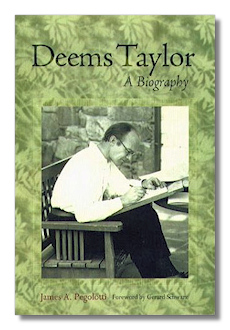
The Internet's Premier Classical Music Source
Related Links
-
Introduction
Acoustics
Ballet
Biographies
Chamber Music
Composers & Composition
Conducting
Criticism & Commentary
Discographies & CD Guides
Fiction
History
Humor
Illustrations & Photos
Instrumental
Lieder
Music Appreciation
Music Education
Music Industry
Music and the Mind
Opera
Orchestration
Reference Works
Scores
Thematic Indices
Theory & Analysis
Vocal Technique
Search Amazon
Recommended Links
Site News
 Book Review
Book Review
Deems Taylor

A Biography
James A. Pegolotti
Gerard Schwarz, intro
Boston, Mass.: Northeastern University Press. 2003
ISBN-10: 1555535879
ISBN-13: 9781555535872
Summary for the Busy Executive: The man who had everything.
I suppose that if anybody recognizes the composer Deems Taylor's name, they do so through his role as compère in Disney's Fantasia, where he gently prepared the audience for the next segment they were about to hear. The parsimonious Disney fought with the prestige-hungry Disney and lost. Fantasia, to his mind, was to be his visionary masterpiece, so he couldn't hire just any old studio announcer. Instead, he stalked and landed perhaps the best-known advocate for classical music in North America. Taylor was so recognizable, in fact, that when Warner Brothers genius cartoon director Bob Clampett parodied the Disney milestone with A Corny Concerto, he turned Elmer Fudd into a klutzy Deems ("Wasn't that wuhvwy?"), and probably almost everyone in the audience got the joke.
During the Twenties and especially during the golden age of radio, Taylor was the Great Explainer of matters musical, particularly through his breezy, witty commentary for nationwide broadcasts of the New York Philharmonic. Nobody else came close until Leonard Bernstein and his Young People's Concerts. In the Thirties and early Forties, he showed up all over the radio: guest spots on Duffy's Tavern, It Pays to be Ignorant, and The Fred Allen Show; semi-permanent panelist on Information Please. Taylor also wrote best-selling books, mostly on music, and became one of the top newspaper critics in New York. He belonged to the Algonquin Round Table, its only musical member, and possessed a lightning-fast mind that could quip with the best of them, having begun his writing career as a "contrib" to F.P A.'s legendary column. He frequented the Stork Club and 21, married and amicably divorced three beautiful women, and strung together a life-long chain of affairs (each tryst meticulously noted in his appointment book) with younger women – toward the end, several decades younger. He dated Miss America. Not bad for a short, slight bald guy with cheaters. All things considered, a glamorous life, well beyond the capabilities and incomes of most composers.
Nevertheless, Taylor thought of himself primarily as a composer and wanted that accolade the most. He certainly had the regard of the general public. His first two operas, The King's Henchman (libretto by Millay) and Peter Ibbetson, actually made big money for the Metropolitan. Two of his cantatas – The Chambered Nautilus and The Highwayman – won national prizes, as did his orchestral masterpiece, Through the Looking-Glass.
As a composer, Taylor had only the briefest formal training, mainly in harmony. He learned counterpoint and orchestration on his own. He began and ended as an Impressionist-cum-Neoromantic, more or less Modern when he began, hopelessly old-hat when he finished. The real Modernists – Copland, Thomson, Sessions, Piston, Ives, et al. – had completely routed such lights as Carpenter, Phillips, Gilbert, Converse, Mason, and even to some extent Griffes. However, at the remove of forty years, these changes in fashion matter less and less. Taylor's music is well-made and almost always inspired, and from what I can tell, audiences like it. Unfortunately, there's not a lot of it, and what there is tends to confine itself to a rather restricted neighborhood. Almost all of it comes from Taylor's love of fantasy and literature. You won't find sonatas or symphonies or even adult emotions and deep, passionate currents. Taylor needed some extra-musical stimulus to get started and didn't seem able to sublimate his original impulse into abstract form. Overall, Taylor's career strikes me as that of a gentleman who lived by his wits, rather than that of a writer with an inner need.
Taylor had legitimate needs for money, but he also had a taste for the high life. His scattered his tremendous hustle among so many different areas that he could never focus on one thing, and his need for money drove him to it. One year, he spent ten percent of his income on night-clubbing. He lived very, very well, earning tens of thousands per year during the Depression. His yearly royalties from his compositions represented a mere fraction. In fact, he could earn more from two weeks on the radio than from his original music. Consequently, something almost always interposed itself between Taylor and actual composing. However, when radio networks began to abandon classical music in the Forties, Taylor had to scramble to reinvent himself. Mommas, don't let your babies grow up to be composers.
Pegolotti has undoubtedly written the standard biography of Taylor, and (Taylor would probably have liked this) he's not a professional musicologist. He has meticulously researched the book from a hunk of primary material, and he writes wittily and gracefully as well. Taylor's art (and life), after all, doesn't have as much intrinsic interest as, say, Stravinsky's, but Pegolotti keeps you interested. An unusually full and vivid portrait of this Manhattan Proteus emerges. In addition, the book raises a number of social questions about the role of classical music in the United States and how to popularize it. Taylor, one must say, didn't have an audience any more musically sophisticated than today. But he did have backing – national networks willing to program classical music – and he reached people of all economic levels and regions. Radio is fast disappearing as a musical source – even a popular one – replaced by the download. This may be a triumph for democracy, but not necessarily a triumph of enlightenment. How do we digitize Deems Taylor?
Copyright © 2008 by Steve Schwartz.


















